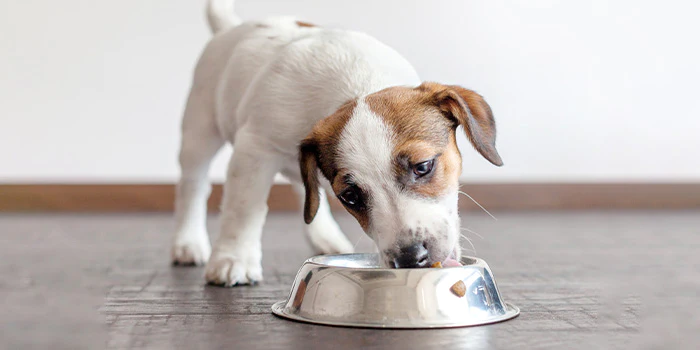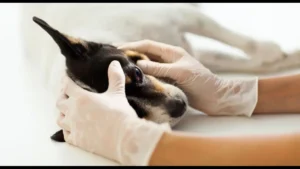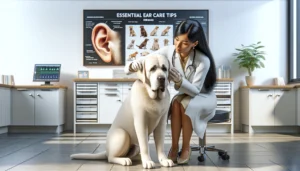It is a happy and exciting time when you bring a new puppy into your home. One of the most important things you can do as a responsible pet owner is to ensure that your furry friend gets a healthy, balanced diet. A healthy puppy diet is the foundation for your puppy’s lifelong health, growth, and vitality. This article discusses six simple puppy diet tips to help you give your new family member the best possible start.
Table of Contents
Toggle1. Consult with a Veterinarian:
It’s important to consult your vet before making any major changes to your puppy’s diet. A professional can provide specific advice based on your puppy’s breed, size, age, and health. They can help you create a feeding plan and tell you about certain nutrients that are important for your puppy’s growth. With the help of your veterinarian, you can ensure that your puppy’s specific nutritional needs are met.
2. Choose Good Food for your Puppy:
Choosing the right puppy food is important for their overall health. Choose a high-quality store-bought puppy food made specifically for puppies that age and size. If you want a brand that doesn’t use fillers like corn and soy, look for a brand that lists chicken or beef as the first ingredient. These fillers are not so good for you and can worsen digestive problems.
Check the nutritional information on the package to ensure it meets the standards of reputable pet food groups. If you decide to prepare food for your puppy at home, talk to your vet to ensure he is getting a balanced and complete diet.
3. Develop a Regular Nutrition Plan:
When feeding your puppy, it is important to be consistent. Establish a regular feeding schedule with several small meals per day, especially for a young puppy. This helps keep their blood sugar levels stable and gives them constant energy to play.
For example, puppies under six months of age may benefit from eating three to four meals a day. As they get older, they can only eat two meals a day. Free food can cause you to overeat and develop weight problems, so stay away from it. Establishing regular feeding times is another way to help your puppy adjust to his new home.
4. Monitor Portion Sizes and Adjust as Needed:
Puppies proliferate and their food needs change accordingly. Monitor your puppy’s weight and change portion sizes as necessary. Eating too much can make you fat and cause health problems while eating too little can stunt your growth and development.
Depending on your puppy’s age, breed, and activity level, your vet can tell you how much food to feed him. Also be careful with treats and snacks, as these can increase your puppy’s overall calorie intake. Choose foods that are healthy for your puppy and add them to your dog’s daily calorie count to keep his diet balanced.
5. Ensure Adequate Hydration:
Water is an important part of your puppy’s diet. Make sure your puppy always has access to clean, fresh water. Staying hydrated is important for digestion, nutrient absorption, and overall health. Monitor how much water your puppy drinks, especially when it’s hot outside or after a lot of play.
If you feed your puppy dry food, you may need to give him some wet or canned food occasionally. Wet food contains more water than dry food, which helps keep your puppy hydrated and can provide a welcome change in texture and taste.
6. Introduce New Foods Gradually:
As your puppy gets older, you may need to start offering him different foods to make his diet more interesting and accommodate any food allergies or preferences. But it’s important to introduce new foods slowly. Changes that occur quickly can upset your stomach and cause diarrhea or vomiting.
If you want to change your puppy’s diet or introduce him to a new food, do so slowly over 7 to 10 days. Over time, add more and more of the new food to the old food to allow your puppy’s digestive system to adjust to the new food. Watch for signs of pain or allergies and consult your vet if you have any concerns.
Conclusion
Feeding your puppy a healthy, balanced diet will keep him healthy and happy throughout his life. You can keep your puppy healthy by talking to your vet, choosing high-quality puppy food, establishing a regular feeding schedule, watching how much food he eats, making sure he stays hydrated, and introducing new foods slowly. Remember that every puppy is different, so pay attention to his needs and enjoy the fun process of training your new friend.
FAQs
1. Why is it important to consult your vet before changing your puppy’s diet?
Your vet can provide advice based on your puppy’s needs to ensure his health and growth needs are met. Plus, they can answer all your questions and help you choose the best food for your puppy.
2. What good nutrition should I pay attention to for my puppy?
When shopping for puppy food, look for brands that list chicken or beef as the first ingredient. Do not use fillers such as soy and corn. Check the nutritional content of the food to ensure it meets the standards of a reputable pet food group.
3. How often should I feed my puppy and why is it important to feed him at the same time every day?
When puppies are young, they do better if they are fed several small meals throughout the day. Establishing a regular feeding schedule will help your puppy get used to a routine and keep blood sugar levels under control.
4. How do I track how much my growing puppy eats?
Monitor your puppy’s weight and vary the amount of food he or she eats if necessary. Discuss with your vet how much food your puppy should eat based on his age, breed, and activity level. Remember that snacks and snacks add to your total calories.
5. Why is it important for my puppy to stay hydrated? How do I ensure that they drink enough?
Staying hydrated is important for digestion, nutrient absorption, and overall health. Make sure your puppy always has access to clean, fresh water. Keep an eye on how much water they drink, especially when it’s hot outside or after play, and consider offering them wet or canned food to increase their water intake.
6. What is the best way to feed my puppy new food?
To avoid stomach upset, introduce new foods slowly over 7-10 days. Add more and more new foods to old foods, watching for signs of illness or allergies. If you are concerned about changing your puppy’s diet, ask your vet for advice.



